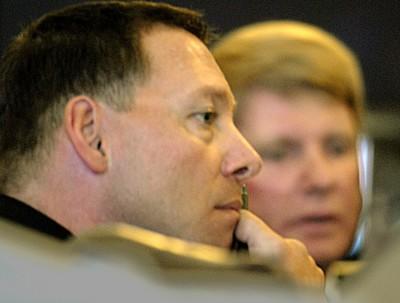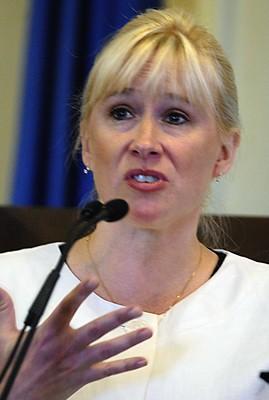Defense submits new theory


RENO — Defense attorneys for Chaz Higgs on Tuesday provided a new theory for how former state Controller Kathy Augustine’s died last summer: She suffered from a heart condition known as mitral valve prolapse, which, with other factors, resulted in her death.
Attorney David Houston, defending Higgs on a murder charge, maintained that Augustine suffered from the condition in which the left heart valve does not open and close properly and sometimes leads to blood regurgitation or leakage. It’s the first time such a scenario has been suggested.
The prosecution laid out a divergent account in opening statements before the jury of eight women and four men. The premise was simple: Higgs, 43, a critical care nurse, wanted out of his three-year marriage and injected his 50-year-old wife with the powerful muscle relaxant succinylcholine.
"Chaz Higgs is a calculated murderer who used his occupation to get rid of his wife," Deputy Washoe County District Attorney Christopher Hicks said during a brief statement.
Succinylcholine, Hicks said, leaves a person paralyzed. "They cannot move. They cannot breathe. They can’t even blink their eyes."
The drug is used in emergency rooms to help doctors insert breathing tubes into patients’ throats and can be lethal if a patient’s respiration is not maintained by medical personnel.
Higgs worked at Carson-Tahoe Hospital in Carson City at the time of his wife’s death and had access to the drug, Hicks said.
But Houston said he will produce medical witnesses who will testify that mitral valve prolapse can cause blood clotting in the heart, and can be fatal.
He said after court that his investigators had discovered the condition as a result of a detail in an autopsy report, which mentioned Augustine showed signs of blood regurgitation.
The investigators then searched Augustine’s medical records, Houston said, and discovered that in 1994 her Las Vegas dentist required her to take special medication before he would perform surgery because of her heart condition.
He added they then found the Las Vegas cardiologist who had discovered her mitral valve prolapse.
Coupled with stress and being overweight, it all led to Augustine’s death, Houston said. Augustine weighed 189 pounds when she died and was working as state controller during the day and campaigning for state treasurer after work.
Despite Houston’s contentions that mitral valve prolapse can be fatal, a Clark County health official interviewed Tuesday said it rarely causes health problems.
"This is a very innocent problem that you are born with and most people are totally unaware that they have it,” said Dr. Carlos Fonte, a Las Vegas cardiologist. "It’s usually diagnosed in young people who have heart murmurs.”
About 5 percent of the population has mitral valve prolapse disorder, and most have no symptoms. Those who do have symptoms can experience chest pain, a rapid pulse, rapid heartbeats, migraine headaches, fatigue and dizziness.
"In rare cases can mitral valve prolapse be life-threatening,” Fonte said. "As you get older, the valve continues to weaken and then it starts to leak more and more. In those cases the valve may have to be repaired or replaced. That’s unusual, though.
"In those patients who may be experiencing more severe symptoms such as arrhythmias of the heart or leaky valve, we can prescribe certain medications to control those problems," he said.
Hicks maintained an autopsy performed on Augustine’s body by Dr. Ellen Clark last July 12 showed no evidence of a heart attack.
And in seeking to arrest Higgs last Sept. 28, Reno Police Department Detective David Jenkins filled out an affidavit in which he stated Clark "did not find an evidence of coronary arrest or heart disease that was typically associated with a sudden and unexpected heart attack."
But Houston maintained Tuesday that Jenkins "left a lot of things out" and set out to disprove the poisoning theory.
With the assistance of an anesthesiologist testifying for the prosecution, Houston used a syringe to show how much of the drug would be needed and how long it would take — more than 10 seconds — to inject her with enough to paralyze her with the medically recommended dosage.
The anesthesiologist, Dr. Paul Mailander, agreed an unwilling patient would resist, something Houston said would leave a tear wound that the autopsy doesn’t show.
Under cross-examination, Mailander said a much smaller dose could result in severe weakening of the patient, short of paralysis.
Hicks said the Carson City hospital and Reno’s Washoe Medical Center — where Higgs also worked — had few controls in place to prevent nurses from removing kits containing succinylcholine and other drugs kept in a refrigerator.
He added that police found an unopened bottle of Etomidate — a paralytic that is sometimes used in conjunction with succinylcholine — in the couple’s Reno home when they searched the residence a day after Augustine’s death. Hicks said Etomidate was stored next to succinylcholine in the refrigerator at Washoe Medical Center.
Also Tuesday, jurors heard Higgs’ 911 call — a call the prosecution says shows Higgs was calmer than he should have been.
The dispatcher taking the call said he’d never heard someone so calm in such a situation who could give such detailed directions to the home and carry on such a lengthy conversation.
"There’s typically a great sense of urgency, pretty much a panic at a different level," said George Reade, a communications supervisor for a local emergency response agency who estimates he’s taken about 37,000 emergency calls.
Under cross-examination, Reade said he didn’t know Higgs had been a medic in the military for 15 years.
Reade acknowledged such medical personnel undergo extensive training to remain calm, but added, "when it comes to loved ones, it tends to be different."
Also taking the stand Tuesday was Kim Ramey, a nurse who worked with Higgs at Carson-Tahoe Hospital. She testified she was concerned about the "aura of anger" Higgs showed when he discussed his wife in informal conversations on July 7.
She overheard a phone conversation when Higgs argued with Augustine.
Ramey also said Higgs told her that Reno businessman Darren Mack "did it all wrong." Mack has been charged with stabbing his wife to death and shooting District Judge Chuck Weller in June 2006.
Ramey recounted Higgs telling her, "’If you want to get rid of someone, hit them with a little succs because they can’t trace it post-mortem."
Despite her concern about his behavior, Ramey acknowledged she invited Higgs to a party that evening.
Also Tuesday, FBI chemist Madeline Montgomery testified she found traces of both succinylcholine and succinylmonocholine when she tested samples of Augustine’s urine. Succinylmonocholine occurs when succinylcholine breaks down.
The FBI’s positive test for the drugs led to Higgs’ Sept. 29 arrest.
Montgomery said on cross-examination there is no standard operating procedure for testing succinylcholine, although she was confident the tests she performed were accurate.
Houston contended testimony by Montgomery’s supervisor on succinylcholine led to the false conviction of Dr. Bill Sybers, a Florida doctor accused of killing his wife in 2001. His conviction later was overturned.
"Is it an evolving science?" Houston asked Montgomery about the testing for the drug.
"Absolutely," she replied.
The Associated Press contributed to this report.
KATHY AUGUSTINE DEATHNews, information











